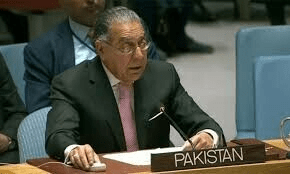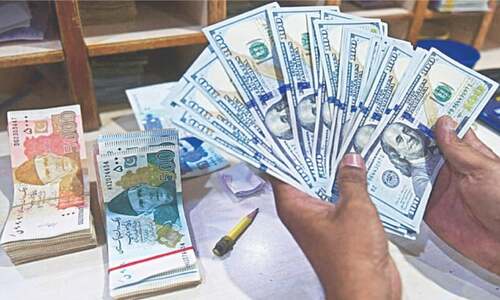ISLAMABAD/WASHINGTON: Foreign Minister Shah Mehmood Qureshi has said that he had “constructive engagement” with his counterparts in Iran, the United States and Arab countries on efforts to defuse tensions and promote peace in the Middle East.
Mr Qureshi made the statement through his official Twitter account after returning to the country early on Sunday.
“[I] visited Iran, Saudi Arabia, Oman, US and Qatar on Prime Minister Imran Khan’s directive. Had constructive engagement with counterparts on efforts to defuse tensions & promote peace in [the] ME. Pakistan’s message I took to all; We stand for peace and stability in the region,” he said.
Through another tweet, Mr Qureshi said that during his visit to the US, he got the opportunity to meet Secretary General of the UN António Guterres and during the meeting, he apprised him of the situation in India-held Kashmir.
“[I] also met UNSG @antonioguterres in NY [New York] where I underscored the critical importance of the international community’s continued attention to the suffering of Kashmiris under Indian occupation and for this to be resolved in line with UN resolutions and the will of the Kashmiri people.”
Islamabad wants Trump to discuss Kashmir issue with Indian leaders
Earlier, while reviewing his US visit with journalists at the Pakistan’s embassy in Washington, Mr Qureshi stated that Pakistan wanted US President Donald Trump to discuss the Kashmir issue with Indian leaders if he visited New Delhi next month.
The foreign minister said US Secretary of Commerce Wilbur Ross would soon visit Pakistan with a delegation of American businessmen to explore investment possibilities.
“I discussed this with Secretary [of State Mike] Pompeo on Friday and he assured me that Secretary Ross will soon visit Pakistan with a delegation,” Mr Qureshi said.
Mr Pompeo’s response to Pakistan’s request for reviewing travel advisories was also “positive”, he added.
US travel advisories depict Pakistan as a country not safe for tourists, which hampers Islamabad’s efforts to promote tourism.
Mr Qureshi said Pakistan wanted President Trump to raise the Kashmir issue in New Delhi because the situation in the occupied valley remained grave.
“Curfew in the valley entered its sixth month. Human rights violations continue. Media restrictions are unchanged. Pellet guns are still used. People are disappearing. Women are dishonoured,” he said.
The foreign minister noted that India arranged a guided tour of some New Delhi-based diplomats to the selected areas in held Kashmir to hide the real situation.
“But we want President Trump to discuss the real situation with the Indian leaders,” he said.
Mr Qureshi pointed out that the UN Security Council held two meetings on Kashmir in the past five months, negating India’s claim that this was an internal matter.
“It is an unresolved issue, which needs the attention of world leaders like President Trump,” he said.
“I told Secretary Pompeo, please take notice of this as the situation can get worse,” he added.
On Iran, he said, Secretary Pompeo acknowledged Pakistan’s positive role. “I told them clearly that Pakistan is not playing a mediatory role. Our objective is de-escalation. We want to avoid a new war in the region.”
He said Pakistan was against this war because it would have a “negative impact on the country, region and the world. Oil prices will go up, which will have an adverse impact on Pakistan’s economy”.
Asked who would Pakistan side with if there’s a war, he said: “We told them we can be partner for peace, not war.”
The Iranian leaders, he said, told him that they wanted to improve their relations with all countries in the region, including Saudi Arabia and the UAE. The leaders in Tehran, he said, had identified “Iraq, Syria, Lebanon, Yemen and Bahrain as areas of differences” and told him that they wanted talks with Arabs on this issue.
Published in Dawn, January 20th, 2020














































